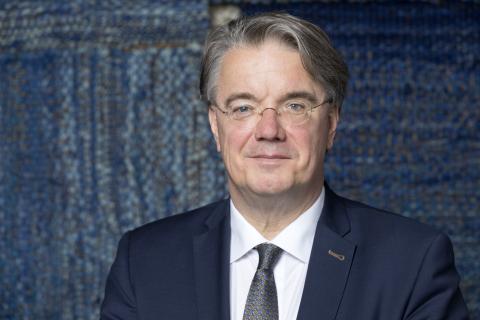Wim van de Donk on connecting and collaborating: “Using other muscles than the ones we normally use”
This era of transitions requires ways of connecting and collaborating that go beyond the boundaries of disciplines and organizations. By pursuing such avenues, Tilburg University seeks to increase its contribution to society.
In a rapidly and radically changing world, universities can ill afford to carry on as before, Wim van de Donk believes. “In our sector, the unrest about digitalization, the profound changes in political culture, and the energy transition is palpable.” This, the Rector Magnificus and President of the Executive Board believes, calls for change, and Tilburg University heeds it. “The last thing we want is for reality to catch up with us while we are sitting back, thinking all will be well.” That is why the university has made the strategic choice of moving boldly forward. “We have made this conscious choice for being courageous in recognition of the inevitable fact that we must take decisions that radically diverge from our current practices. And we do so knowing full well that universities have been around for a very long time and are resilient. There were universities before there were governments.”
That said, it is by no means dogma that in times of transition everything must change. In its traditional, independent role, a university adds a great deal of value, van de Donk asserts. “Critical thinkers are more valuable than ever before. Transformations need scientists who have the freedom and independence to do research. Consider the energy transition. Energy grids are changing because we’re moving from central to local power generation. Saskia Lavrijssen of Tilburg Law School is exploring how such future facilities can be regulated.”

If we should find ourselves in trouble, the corporate sector and the municipal government should take to the barricades
Rector Magnificus Wim van de Donk
Barricades
What the university is keen to change is the intensity of its connections and collaborations. Achieving higher levels of collaborative connectedness is a key objective in the 2022-2027 Strategy, and in aiming for it the university seeks to increase its contribution to society. Van de Donk is confident the knowledge generated in his organization can benefit the world in which the university operates. There is no shortage of examples. “A Professor like Jan Fransoo, who’s an expert in logistics and digitalization, has a lot to offer to businesses. That also goes for Bart Bronnenberg, who’s an authority in marketing in relation to a healthy lifestyle and wholesome food.” He also mentions Professor of Corporate Ethics Wim Dubbink. “In the Covid-19 pandemic, he responded to the call of the Elisabeth-Tweesteden Hospital to help them engage in conversations about complicated matters.” Appreciation for the university’s role as supplier of knowledge and talent is growing, van de Donk observes. CEO Peter Wennink of ASML is amongst those who recognize the university’s unique position. “When he was here, he said ‘We need engineers as much as we need top-notch economists and lawyers who can help us move with the changes that are coming our way’.” To van de Donk, it matters a great deal that the corporate sector and the municipal government experience the university’s added value. “Let me put it like this: if we should find ourselves in trouble, they should take to the barricades.”
Our strength is and will continue to be our reliability and independence as suppliers of knowledge. We will always protect the autonomy of our researchers.
Ecosystems
Like a seaport, van de Donk expounds, the university is a gateway to a wide range of local and international connections. For example, Tilburg University has long-standing relationships with the province of North Brabant, the City of Tilburg, national and international alliances, and platform networks such as Midpoint Brabant, Brainport, Brainport Smart District. The university now seeks to tighten these bonds to increase its impact on the world it inhabits – an aspiration that is characterized in the Strategy as strengthening and structurally embedding ecosystems. The university is going to devote more time and attention to these ecosystems on a structural basis, for example by earmarking more human resources for this endeavor.
New ecosystems are also evolving and gaining prominence. These are the Academic Collaborative Centers: Governance and Management for Broad Prosperity, Climate & Energy, Inclusive Labor Market, and Digital Health & Mental Wellbeing. In these centers, researchers and students are working together with strategic partners to resolve major societal issues, and the university encourages its academic staff to collaborate in these centers with fellow academics from other disciplines as well as organizations outside the university. Van de Donk: “What these centers have in common is that they enable us to develop lines of research together with partners from different sections of society. For researchers, that will take some getting used to; it’s a bit like using other muscles than the ones we normally use.” Collaboration does not mean that Tilburg University will dance to the tune of its partners, however. “Our strength is and will continue to be our reliability and independence as suppliers of knowledge. We will always protect the autonomy of our researchers.”
'Weaving Minds & Characters' Strategy Towards 2027
Stay up-to-date on all strategic developments and activities leading up to our 100th anniversary.
